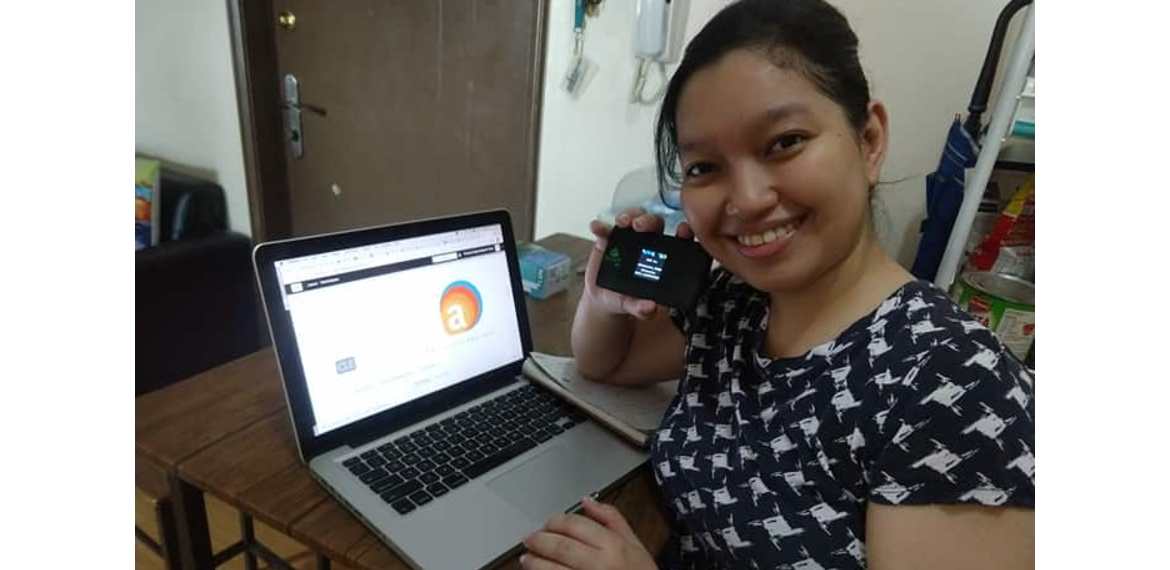The Covid-19 pandemic has disrupted everyone’s regular routines, including school classes from kinder to college. Some educational institutions, however, are not letting the virus stop their students’ learning. Indeed, along the way, they are learning valuable life lessons.
One of these schools is St. Scholastica’s College (SSC) Manila, where teachers and students are using messaging apps, video conferences, personal computers, and mobile devices to hold their classes online. Classes at SSC for all levels are continuing until the end of its school year in May. With SSC ending their online classes on April 24, the students will spend the following weeks finishing their remaining school work with the guidance of their teachers.
“The crisis definitely had major effects on our learning targets, specifically students’ attainment of required competencies. Teachers’ plans also changed drastically because of our inability to conduct face-to-face classes. We had to immediately shift to online mode of instruction to ensure that learning is still taking place,” said St. Scholastica’s College Manila high school principal Dr. Jonna Marie A. Lim.
Self-paced learning
According to Dr. Lim, the teachers have had to change the way they teach and the way students learn. The teachers have shifted to self-paced instruction, where they encourage students to regulate their own learning. Subject area coordinators monitor the process to ensure clear instructional support is in place. Students can ask and clarify lessons from their teachers, and school work is manageable.
This new mode of learning is enabled by internet connectivity. Even if both teachers and students are at home, web tools enable them to interact online. According to Dr. Lim, these online classes enable the students to achieve some of the learning competencies set for the year.
“Even if at times we feel it is not as effective as traditional classroom sessions, online learning gives us an opportunity to reach out to our students, talk to them, ask them how they are, and how we can be of help to them,” Dr. Lim said.
Apart from the limited face-to-face interactions, one of the challenges of doing online classes is the stability of the internet connection of both teachers and students. The school addresses this concern by limiting synchronous classes and letting students complete their lessons within a given timeframe.
Online tools
“Some teachers conduct video conferencing with the entire class, but not all students can join (because of their limited internet connection). So we opted for lower bandwidth solutions, like recording and uploading the video conference, as well as other teacher-made videos and learning materials, which students can access in their own time,” said Lim.
For these sessions, the students and teachers use apps and programs such as Google Classrooms, Phoenix Aralinks, Facebook Messenger, Zoom, and other online tools.
Those with limited connections have turned to using Smart Bro pocket Wi-Fi kits to get online. Through these devices, which run on Smart’s 4G/LTE wireless network, they can easily access SSC’s learning management system, where the lessons are uploaded.
Apart from SSC Manila, students and school staff in a number of private and public schools are also using the services of Smart Communications to resume their classes online.
“Because of the pandemic, schools have had to go online in order to continue their classes. This is a massive shift that requires major adjustments on the part of teachers and students. We at PLDT and Smart are doing everything we can to help schools, teachers and students by providing connectivity and solutions through our fixed and mobile networks,” said Smart president and chief executive officer Alfredo S. Panlilio.
Life lessons
Though the pandemic has indeed created many difficulties for the school, Dr. Lim says that the Covid crisis has also taught the school, teachers and students valuable life lessons.
“I am sad that our students are deprived of many of their high school memories, but I am also proud of them for doing their school work diligently while helping their parents at home, engaging in various advocacies to help different sectors and voicing out their opinions on matters of public interest. I also thank our teachers for working responsibly and reaching out to our students the best way they can, even if they’re also facing personal issues at home,” she said.
“Our students’ parents tell us that they appreciate the fact that our Scholasticans are still doing something meaningful while they’re on quarantine,” said Dr. Lim. “The connection with our students that we continue to foster and protect, though virtual, is something that we greatly value as an institution,” she added.












